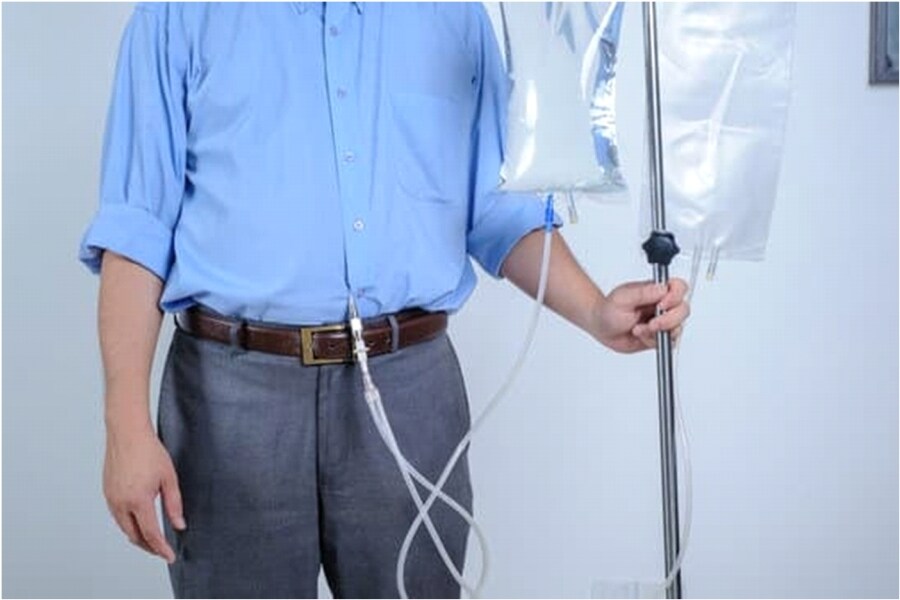Dialysis or kidney transplantation - which one is better?
Prof Dr. Nisith Kumar Mohanty, MD, DM, FISN, FISOT, Chief Consultant Nephrologist, Apollo Hospitals, Bhubaneswar, Odisha


 Dialysis and kidney transplantation are treatments for severe kidney failure, stage 5 chronic kidney disease, and end-stage kidney disease(ESKD). There are two types of dialysis: hemodialysis and peritoneal dialysis. When the kidneys are no longer working effectively, waste products, electrolytes (such as potassium, phosphorus, and acids), and fluid build-up in the blood. Dialysis takes over a portion of the function of the failing kidneys to remove the fluid and waste products. Kidney transplantation can even more completely take over the function of the failing kidneys.
Dialysis and kidney transplantation are treatments for severe kidney failure, stage 5 chronic kidney disease, and end-stage kidney disease(ESKD). There are two types of dialysis: hemodialysis and peritoneal dialysis. When the kidneys are no longer working effectively, waste products, electrolytes (such as potassium, phosphorus, and acids), and fluid build-up in the blood. Dialysis takes over a portion of the function of the failing kidneys to remove the fluid and waste products. Kidney transplantation can even more completely take over the function of the failing kidneys.
When Will Dialysis Or Kidney Transplantation Be Needed?
As the kidneys lose their ability to function, fluid, waste products, and electrolytes begin to build up in the blood. A kidney transplant should be performed or dialysis should begin before kidney disease has advanced to the point where life-threatening complications occur. This usually takes many months or years after kidney disease is first discovered, although sometimes severe kidney failure is discovered for the first time in people who were not previously known to have kidney disease. It is best to begin dialysis treatments while the patient still feel well and have only mild symptoms of kidney failure.
Kidney Transplantation
Kidney transplantation is considered the treatment of choice for many people with ESKD because quality of life and survival (life expectancy) are often better than in people who are treated with dialysis. However, there is a shortage of organs available for donation. A kidney can be transplanted from a relative, an unrelated person (spouse or friend), or from person who has died (deceased or cadaver donor) only one kidney is required to survive.
Advantages: Kidney transplantation is the treatment of choice for many people with ESKD. A successful kidney transplant can improve quality of life and reduce the risk of dying. People who undergo kidney transplantation do not require hours of dialysis treatment. Long term cost of therapy is less than dialysis.
Disadvantages: Kidney transplantation is a major surgical procedure that has risks both during and after the surgery. The risks of the surgery include infection, bleeding, and damage to the surrounding organs. Even death can occur, although this is very rare.
Dialysis
Hemodialysis

In hemodialysis, blood is pumped through a dialysis machine to remove waste products and excess fluids. Blood passes along the tube and into an external machine that filters it, before it"s passed back into the arm along another tube. At dialysis centers, this is usually. Carried out 3 days a week, with each session lasting around 4 hours. Hemodialysis can be done in a special dialysis center in a hospital or at home.
Advantages: Hemodialysis generally requires relatively few hours of treatment per day and does not usually include treatments every day. It do not require patients to learn much about the dialysis procedure itself.
Disadvantages: Low blood pressure is the most common complication of hemodialysis and can be accompanied by lightheadedness, shortness of breath, abdominal cramps, & nausea.
It is costly,somebody has to accompany patient,loss of wages on day of dialysis.Still not widely available ,patient has to travel long distance.
Peritoneal Dialysis

Peritoneal dialysis is typically done at home. To perform peritoneal dialysis, the abdominal cavity is filled with dialysis fluid (called dialysate) through a catheter (a flexible tube). The catheter is surgically inserted into the abdomen near the umbilicus (belly button).
Advantages: Compared with hemodialysis, it include more uninterrupted time for work, family, and social activities. Many people who use peritoneal dialysis are able to continue working. Suitable for elderly,patient staying far of places,no transport facility.
Disadvantages: Peritoneal dialysis is less efficient than hemodialysis. It takes longer periods, and it removes around the same amount of total waste product, salt, and water as hemodialysis.
Which Therapy Is Best?
Kidney transplantation is the optimal treatment for most patients who do not have one of the reasons to be ineligible for transplant. I will recommend it all younger patients.Patients who are not candidates for kidney transplantation or who must wait for a kidney can usually be treated with either hemodialysis or peritoneal dialysis. Choosing between peritoneal dialysis and hemodialysis is a complex decision that is best made by the patient, doctor, and often other family members or caregivers after careful consideration of a number of important factors including underlying medical problems.
Hemodialysis involves rapid changes of the fluid balance in the body and cannot be tolerated by some patients. Some patients are not suitable candidates for kidney transplantation, while others may not have the home supports or abilities needed to do peritoneal dialysis. Patient’s overall medical condition, personal preferences, and home situation are among the many factors that should be considered. It is possible to switch from one type of dialysis to the other if preferences or conditions change over time.
Thank You!!!
The pages slugged ‘Brand Connect’ are equivalent to advertisements and are not written and produced by Forbes India journalists.
First Published: Dec 30, 2022, 16:10
Subscribe Now